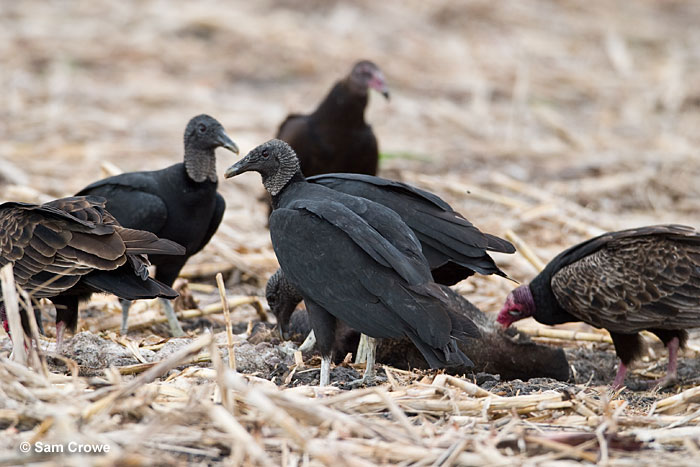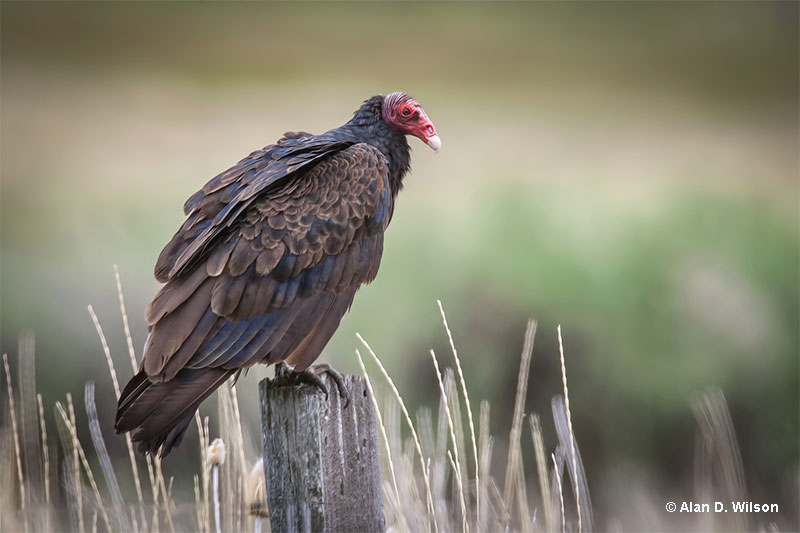
Vultures might not be the prettiest of birds, but they are very important. These scavengers reduce disease and help keep natural places clean!
They do it by eating dead animals and a good thing too. If not, there could be a lot more bacteria and pathogens in our water and soil.
But they do have one distinct adaptations – one of those is a bare, unfeathered, and wrinkled head. Why do vultures have bare heads? Is it related to their unique diet?
Key takeaways:
- Vultures feed exclusively on carryon; they do not kill their prey themselves.
- For the longest time, the bald heads of vultures have been associated with avoiding diaseses.
- Some ornithologists have suggested that having no feathers on their heads might be associated with temperature regulation.
On this page
Why do scavengers have bald heads?
Most vultures and some other scavengers have bald heads. For the longest time, ornithologists assumed this was to avoid having a dirty head when feeding on messy and bloody carcasses.
It certainly seems like it would be easier to clean a bald head than one with feathers! Although cleanliness may play a role, there might be another, bigger advantage to having a bald head.
According to studies carried out by researchers from Glasgow, Scotland, vultures might have bald heads to stay cool! As it turns out, they found that when vultures stretch out their necks and bald heads, it helps them dissipate a large amount of heat.

On the other hand, when they tuck their heads in, they can retain heat. These postures make sense when we think about the places where vultures eat, and the cold, high elevation air where they soar.
Feeding vultures spend a lot of time on the open ground, right under the hot sun. The same goes for some stork and ibis species that also have bald heads. This might also explain why scavenging eagles and some other birds of prey have feathered heads.
Although they can feed on carrion, they don’t eat it as much as vultures, and also spend much less time perched on open ground.
Their Peculiar Diets
For the most part, vultures eat carrion. However, they routinely eat maggots and occasionally kill and eat small animals too.
Contrary to popular belief, vultures don’t eat everything they find. Depending on the vulture species, they can eat and feed on different types of carrion. While Turkey and Black Vultures both scavenge a variety of dead animals, Black Vultures are much more likely to also feed on garbage.
They forage in garbage for bits of discarded food and other decomposing items. While Turkey Vultures and most vultures prefer recently dead animals, it can take them some time to find their prey.
This is probably because they find a lot of their food by sense of smell. It might also be easier for them to bite into a day old dead animal than a freshly killed one.
Related: Are there any poisonous birds in the world?
Turkey and Black Vultures eat most parts of a dead animal, although Turkey Vultures eat more skin and tendons. California Condors also eat most types of carrions along with small bones.
There are similar differences in vulture species from Eurasia and Africa. In general, big vultures eat more meat and sinews while smaller vultures feed on softer carrion, and even dung!
Threatening chemicals and other dangers
We all know that rotten food can make you terribly sick so why doesn’t it affect vultures? Actually, really rotten food could probably make them sick. Vultures much prefer fresh carrion and after three or four days, they stay away from it!
Even so, vultures have defenses to protect them from cholera, salmonella, and other horrible pathogens associated with decaying flesh. They have extremely acidic stomach juices that kill bacteria and parasites, and also have strong immune systems.

Sadly, despite their formidable natural defenses, it’s not enough to protect them from some other, human-caused dangers. One of those is lead shot and bullets.
When vultures and raptors accidentally eat bits of lead in animals killed by hunters, they can succumb to lead poisoning. In particular, this has been a major issue for one of our most endangered birds, the California Condor.
The other main danger to vultures is poison. Vultures and other raptors that eat poisoned rats and other animals also end up getting poisoned.
In Africa, deliberate poisoning of carcasses with lethal pesticides has caused terrible declines in vulture populations. Thousands of vultures in Asia have also died after consuming dead cattle that had been given the anti-inflammatory drug, Diclofenac.
Some Facts About Vultures
- When frightened, Turkey Vultures vomit on would-be attackers!
- Eurasian Griffon Vultures can go without food for nearly a month.
- Some vultures in the Himalayas fly as high as 18,000 feet, and the Ruppel’s Griffon Vulture of Africa can fly as high as 37,000 feet!
- Turkey Vultures are long-distance migrants that can soar from Canada to the Amazon and then back again every year.
- Not all vultures have dark plumage. Both the Egyptian Vulture and the King Vulture have striking white plumage with black flight feathers and a colorful face.
- Egyptian Vultures crack open Ostrich eggs by dropping rocks on them.
- Vulture species live on all continents except for Australia and Antarctica.
- Vultures in North and South America belong to their own family whereas vultures from Eurasia and Africa are in the same family as hawks and eagles.
Frequently Asked Questions
Why do vultures have no feathers?
Vultures have no feathers on their heads to help them cool off when feeding in hot temperatures on the ground, and probably to avoid becoming too messy.
Are all vultures bald?
Yes, all vultures are bald. However, a few Eurasian species are only partially bald or have some fuzzy feathers on their heads.
Why do other birds of prey not have bald heads?
Other birds of prey do not have bald heads probably because they don’t need to cool off as much as vultures, nor stick their heads into carrion as much as vultures do.
Can vultures attack humans?
Vultures do not attack humans. They don’t feel the need to attack us since they feed only on carcasses.

